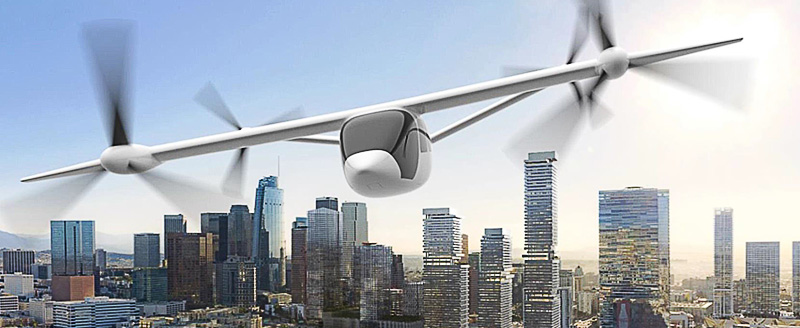Hanwha Systems gearing up to enter air taxi market
Hanwha Systems is making a $25 million investment in US air taxi startup Overair, and has received approval from the relevant authorities for the move.
Hanwha Systems and Overair research and development are planning to co-develop and bring the “Butterfly” to the US air-taxi market by the year 2025.
In early December of 2019, Youn-Chul Kim, CEO of Hanwha Systems, said that the Committee on Foreign Investment in the United States (CFIUS) approved Hanwha Systems’ $25 million investment in Overair (previously K4 Aeronautics), a leading US air-taxi startup.
This closely follows Hanwha Systems’ announcement of its plans to invest in, and partner with, Overair at a time when air taxis are drawing significant attention as the future of transportation.
Overair was spun-off from Karem Aircraft, an aerospace-development firm that specializes in aircraft capable of vertical take-off and landing (VTOL).

Overair is a pioneer in the development of air taxis and one of the key partners of Uber Elevate. Uber is a global ride-sharing service and Uber Elevate is its project to commercialize air taxis.
The US government’s approval for Hanwha to invest in Overair will accelerate the development of the “Butterfly” personal-air-vehicle (PAV) project.
Hanwha Systems will contribute to the Butterfly’s development to maximize the synergy between technology and business.
The Butterfly is an all-electric VTOL (eVTOL) air-transport vehicle that leverages low-noise and high-efficiency Optimum Speed Tiltrotor technology.
This means, the Butterfly can be employed as an eco-friendly urban air taxi that can travel quietly, safely, and efficiently.
Under its current specifications, the Butterfly will be able to seat four passengers and one pilot while its battery capacity will allow it to achieve airspeeds of up to 240 km/h and a range exceeding 100 km.
Abe Karem is chief designer and co-founder of Overair and founder of Karem Aircraft. He is a renowned aerospace engineer who designed the Predator A–a medium-altitude long-endurance unmanned aerial vehicle (UAV)–and 14 other types of aircraft.
Ben Tigner is CEO of Overair and president at Karem Aircraft. He was formerly VP of Engineering at Frontier Systems and chief engineer for the A160 Program at Boeing.
Overair and Hanwha Systems are working together to get the Butterfly approved as a civilian all-electric air-transport vehicle by the US Federal Aviation Administration.
Hanwha Systems is also looking to increase its investment in Overair and explore opportunities in Korea’s domestic market at the same time.
In addition, Hanwha Systems is currently working on optionally-piloted personal-air vehicles (OPPAV) and a Korean multi-governmental agency development project involving the Ministry of Land, Infrastructure and Transport and Ministry of Trade, Industry and Energy.
Youn-Chul Kim, Hanwha Systems CEO, says: “Hanwha Systems secured the funds to invest in Overair through our recent IPO. We’ve fully completed preparations to enter the air taxi market in earnest.
“We’re strengthening our competitiveness in information and communications technology division and avionics. We’re also investing in air taxis–our company’s future growth engine–by aggressively seeking investment and partnership opportunities worldwide.”
Air taxis are emerging technologies that may change the face of modern transportation. They have the potential to overcome serious issues such as traffic congestion, physical infrastructure limits, noise pollution, and air pollution among other environmental problems.
Government agencies and private companies around the world are actively pursuing air-taxi development thanks to recent progress in battery and motor technologies, collision avoidance, autonomous flight, and other advanced technologies.
In the US, the first air taxis are forecasted to launch pilot services in 2023, with commercialization expected to begin in 2025. Morgan Stanley anticipates that the urban air-taxi transport market will grow to $1.5 trillion by 2040.

